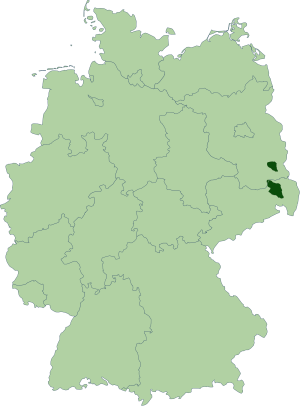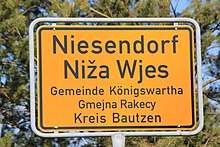Sorbian languages
The Sorbian languages (Upper Sorbian: serbska rěč, Lower Sorbian: serbska rěc) are two closely related, but only partially mutually intelligible, West Slavic languages spoken by the Sorbs, a West Slavic minority in the Lusatia region of eastern Germany. They are classified under the West Slavic branch of the Indo-European languages and are therefore closely related to the other two West Slavic subgroups: Lechitic and Czech–Slovak.[2] Historically, the languages have also been known as Wendish (named after the Wends, the earliest Slavic people in modern Poland and Germany) or Lusatian. Their collective ISO 639-2 code is wen.
| Sorbian | |
|---|---|
| serbšćina, serbsce (Upper Sorbian) serbšćina, serbski (Lower Sorbian) | |
| Ethnicity | Sorbs |
| Geographic distribution | Lusatia |
| Linguistic classification | Indo-European |
| Subdivisions | |
| ISO 639-2 / 5 | wen |
| Glottolog | sorb1249[1] |
 | |
The two Sorbian languages and literary standards are Upper Sorbian (hornjoserbsce), spoken by about 40,000 people in Saxony, and Lower Sorbian (dolnoserbski) spoken by about 10,000 people in Brandenburg. The area where the two languages are spoken is known as Lusatia (Łužica in Upper Sorbian, Łužyca in Lower Sorbian, or Lausitz in German).
History
After the settlement of the formerly Germanic territories (the part largely corresponding to the former East Germany) by the Sorbs' Slavic ancestors in the fifth and sixth centuries, the Sorbian language (or its predecessors) had been in use in much of what was the southern half of East Germany for several centuries, and still had its stronghold in (Upper and Lower) Lusatia, where it enjoys national protection and fostering to the present day.
Outside Lusatia, it has been superseded by German. From the 13th century on, the language suffered official discrimination.[2] Bible translations into Sorbian provided the foundations for its writing system.
Geographic distribution
In Germany, Upper and Lower Sorbian are officially recognized and protected as minority languages.[3] In the home areas of the Sorbs, both languages are recognized as second official languages next to German.

The city of Bautzen in Upper Lusatia is the centre of Upper Sorbian culture. Bilingual signs can be seen around the city, including the name of the city, "Bautzen/Budyšin". The city of Cottbus (Chóśebuz) is considered the cultural centre of Lower Sorbian; here, too, bilingual signs are found. Sorbian has also been spoken in the small Sorbian ("Wendish") settlement of Serbin in Lee County, Texas, and a few speakers possibly still remain there. Until 1949, newspapers were published in Sorbian there. The local dialect has been heavily influenced by surrounding speakers of German and English.
The German terms "Wends" (Wenden) and "Wendish" (wendisch/Wendisch) once denoted "Slav(ic)" generally; they are today mostly replaced by "Sorbs" (Sorben) and "Sorbian" (sorbisch/Sorbisch) with reference to Sorbian communities in Germany.
Linguistic features
Both Upper and Lower Sorbian have the dual for nouns, pronouns, adjectives, and verbs; very few living Indo-European languages retain this as a productive feature of the grammar. For example, the word ruka is used for one hand, ruce for two hands, and ruki for more than two hands. As with most of the Slavic languages, Sorbian uses no articles.
Grammar
The Sorbian languages are declined in six or seven cases:
- Nominative
- Accusative
- Dative
- Genitive
- Instrumental
- Locative
- Vocative (Upper Sorbian only)
| Case | nan father |
štom tree |
bom tree |
wokno window | ||
|---|---|---|---|---|---|---|
| Upper Sorb. | Lower Sorb. | Upper Sorb. | Lower Sorb. | Upper Sorb. | Lower Sorb. | |
| Nom. | nan | nan | štom | bom | wokno | wokno |
| Gen. | nana | nana | štoma | boma | wokna | wokna |
| Dat. | nanej | nanoju | štomej | bomoju | woknu | woknoju, woknu |
| Acc. | nana | nana | štom | bom | wokno | wokno |
| Instr. | z nanom | z nanom | ze štomom | z bomom | z woknom | z woknom |
| Loc. | wo nanje | wó nanje | na štomje | na bomje | na woknje | na woknje |
| Voc. | nano | — | štomo | — | — | — |
| Case | ramjo shoulder |
ramje shoulder, armpit |
žona woman |
žeńska woman, wife |
ruka hand | |
|---|---|---|---|---|---|---|
| Upper Sorb. | Lower Sorb. | Upper Sorb. | Lower Sorb. | Upper Sorb. | Lower Sorb. | |
| Nom. | ramjo | ramje | žona | žeńska | ruka | |
| Gen. | ramjenja | ramjenja | žony | žeńskeje | ruki | |
| Dat. | ramjenju | ramjenjeju, ramjenju | žonje | žeńskej | ruce | |
| Acc. | ramjo | ramje | žonu | žeńsku | ruku | |
| Instr. | z ramjenjom | z ramjenim | ze žonu | ze žeńskeju | z ruku | |
| Loc. | wo ramjenju | wó ramjenju | wo žonje | wó žeńskej | w ruce | |
Vocabulary comparison
The following is selected vocabulary from the two Sorbian languages compared with other Slavic languages.
| English | Lower Sorbian | Upper Sorbian | Serbo-Croatian | Bulgarian | Slovene | Czech | Polish | Polabian | Kashubian | Silesian | Slovak | Russian | Ukrainian |
|---|---|---|---|---|---|---|---|---|---|---|---|---|---|
| person, man | clowek/luź | čłowjek | човек / човјек (čovek / čovjek) |
човек (čovek) |
človek | člověk | człowiek | clawak | człowiek | czowiek | človek | человек (čelovek) |
людина (l'udyna), чоловік (čolovik) |
| evening | wjacor | wječor | вече / вечер (veče / večer) |
вечер (večer) |
večer | večer | wieczór | vicer | wieczór | wieczōr | večer | вечер (večer) |
вечір (večir) |
| brother | bratš | bratr | брат (brat) |
брат (brat) |
brat | bratr | brat | brot | brat | brat | brat | брат (brat) |
брат (brat) |
| day | źeń | dźeń | дан (dan) |
ден (den) |
dan | den | dzień | dôn | dzéń | dziyń | deň | день (den') |
день (den') |
| hand | ruka | ruka | рука (ruka) |
ръка (rəka) |
roka | ruka | ręka | ręka | rãka | rynka | ruka | рука (ruka) |
рука (ruka) |
| snow | sněg | sněh | снег / снијег (sneg / snijeg) |
сняг (snjag) |
sneg | sníh | śnieg | sneg | sniég | śniyg | sneh | снег (sneg) |
сніг (snih) |
| summer | lěśe | lěćo | лето / љето (leto / ljeto) |
лято / лето (ljato / ljeto) |
poletje | léto | lato | ljutü | lato | lato | leto | лето (leto) |
літо (lito) |
| sister | sotša | sotra | сестра (sestra) |
сестра (sestra) |
sestra | sestra | siostra | sestra | sostra | siostra | sestra | сестра (sestra) |
сестра (sestra) |
| fish | ryba | ryba | риба (riba) |
риба (riba) |
riba | ryba | ryba | raibo | rëba | ryba | ryba | рыба (ryba) |
риба (ryba) |
| fire | wogeń | woheń | огањ (oganj) |
огън (ogən) |
ogenj | oheň | ogień | widin | òdżin | ôgyń | oheň | огонь (ogon') |
вогонь (vohon') |
| water | wóda | woda | вода (voda) |
вода (voda) |
voda | voda | woda | wôda | wòda | woda | voda | вода (voda) |
вода (voda) |
| wind | wětš | wětr | ветар / вјетар (vetar / vjetar) |
вятър / ветер (vjatər / veter) |
veter | vítr | wiatr | wjôter | wiater | wiater | vietor | ветер (veter) |
вітер (viter) |
| winter | zyma | zyma | зима (zima) |
зима (zima) |
zima | zima | zima | zaima | zëma | zima | zima | зима (zima) |
зима (zyma) |
References
- Hammarström, Harald; Forkel, Robert; Haspelmath, Martin, eds. (2017). "Sorbian". Glottolog 3.0. Jena, Germany: Max Planck Institute for the Science of Human History.
- About Sorbian Language, by Helmut Faska, University of Leipzig
- "Full list". Treaty Office. Retrieved 2019-02-06.
External links
- Online course for Upper and Lower Sorbian (English, Sorbian, German)
- Euromosaic information page
- Kurs serskeje rěce / Bluń, introductory texts of the lessons included in the Sorbian language textbook Curs practic de limba sorabă (in Romanian)